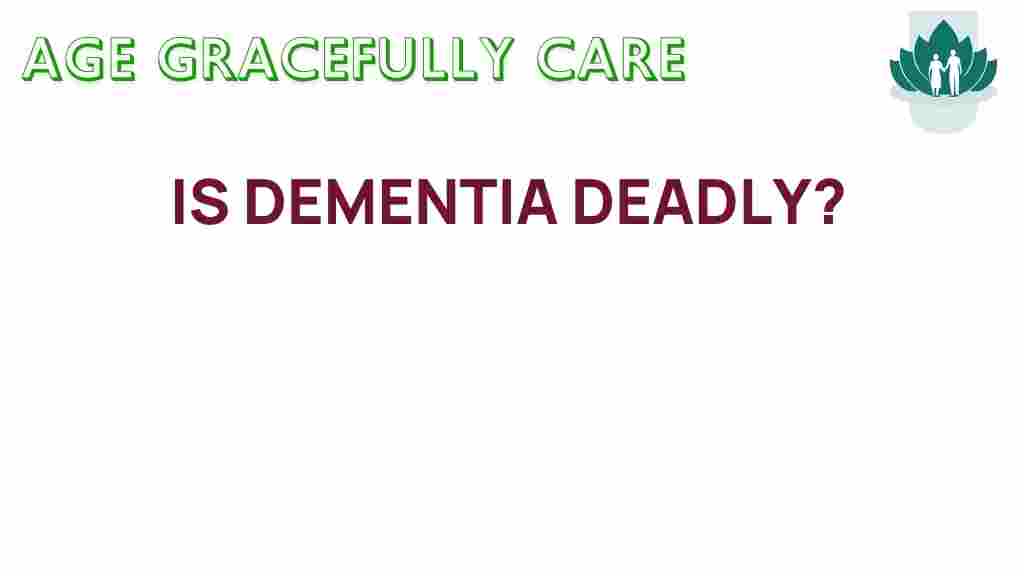Is Dementia a Silent Killer? Uncovering the Truth Behind the Diagnosis
Dementia is often referred to as a “silent killer” due to its gradual onset and the insidious way it affects cognitive function. As we look deeper into this complex disease, it’s essential to understand the myriad health risks associated with dementia, the implications of cognitive decline, and how it specifically impacts the lives of individuals and their caregivers. In this article, we will explore the nature of dementia, its relationship with Alzheimer’s disease, and the significant consequences it poses for mental health and elderly care. Additionally, we will discuss effective prevention strategies that can help mitigate the risks associated with this debilitating condition.
Understanding Dementia and Its Health Risks
Dementia encompasses a range of symptoms associated with a decline in cognitive function severe enough to interfere with daily life. It is not a single disease but rather a term that describes a variety of conditions that affect the brain. Among these, Alzheimer’s disease is the most common, accounting for 60-80% of dementia cases.
The health risks of dementia extend beyond memory loss. Here are some key points to consider:
- Cognitive Decline: Dementia leads to significant cognitive decline, affecting memory, thinking, and social abilities.
- Physical Health Decline: Individuals with dementia may experience a decline in physical health, increasing their vulnerability to other health issues.
- Increased Mortality Risk: Dementia is associated with a higher risk of mortality, particularly in advanced stages.
- Behavioral Changes: Dementia can cause mood swings, depression, and anxiety, seriously impacting mental health.
Alzheimer’s Disease: A Closer Look
Alzheimer’s disease is the most prevalent form of dementia and is characterized by progressive memory loss, confusion, and changes in behavior. Unlike some other forms of dementia, Alzheimer’s typically develops slowly and worsens over time, making early diagnosis critical.
Understanding the symptoms of Alzheimer’s can help family members and caregivers recognize the disease’s progression:
- Short-term memory loss that disrupts daily life.
- Difficulty in planning or solving problems.
- Confusion with time or place.
- Changes in mood and personality.
The Disease Impact on Individuals and Caregivers
The impact of dementia is profound, not only on the patients but also on their families and caregivers. The emotional toll can be significant:
- Emotional Strain: Caregivers often experience stress, anxiety, and depression due to the demands of caregiving.
- Financial Burden: The cost of care can be significant, leading to financial strain on families.
- Social Isolation: Families may become socially isolated as they focus on caregiving responsibilities.
Caregiving: Challenges and Strategies
Caregiving for someone with dementia requires patience, understanding, and specific strategies to ensure the well-being of both the patient and the caregiver. Here are some effective caregiving strategies:
- Educate Yourself: Understanding dementia and its effects can help caregivers respond more effectively.
- Establish Routines: Consistent daily routines can provide comfort to individuals with dementia.
- Encourage Independence: Allowing patients to perform tasks they can still manage promotes dignity and self-esteem.
- Seek Support: Joining caregiver support groups can provide emotional relief and practical advice.
Mental Health and Dementia
The relationship between mental health and dementia is complex. Cognitive decline can lead to feelings of frustration, anger, and sadness. Conversely, mental health conditions can also increase the risk of developing dementia. It is imperative to address mental health issues proactively. Here are some strategies:
- Therapy and Counseling: Engaging with a mental health professional can help both patients and caregivers cope with emotional challenges.
- Physical Activity: Regular exercise has been shown to improve mood and cognitive function.
- Social Engagement: Maintaining social connections can provide emotional support and reduce feelings of isolation.
Elderly Care: A Comprehensive Approach
The care of elderly individuals with dementia must be holistic, addressing not only physical needs but also emotional and social well-being. Here are some key components of effective elderly care:
- Personalized Care Plans: Tailoring care to individual needs can enhance quality of life.
- Safety Measures: Making living environments safe can prevent accidents and injuries.
- Nutrition: A balanced diet is crucial for maintaining health and cognitive function.
Prevention Strategies for Dementia
While there is no guaranteed way to prevent dementia, certain lifestyle choices may reduce risk factors associated with cognitive decline:
- Regular Physical Activity: Engaging in regular exercise can improve blood flow to the brain and support cognitive health.
- Healthy Diet: Diets rich in fruits, vegetables, whole grains, and healthy fats can benefit brain health.
- Cognitive Stimulation: Activities that challenge the brain, such as puzzles and learning new skills, may help maintain cognitive function.
- Social Interaction: Staying socially active can enhance mental health and cognitive resilience.
Conclusion: Uncovering the Truth Behind Dementia
Dementia is indeed a silent killer, as its effects can be devastating yet subtle. Understanding the health risks, the implications of cognitive decline, and the challenges faced by caregivers is essential in addressing this growing concern within our aging population.
By focusing on effective prevention strategies, raising awareness, and providing comprehensive support for both individuals and caregivers, we can mitigate the impact of dementia. It is crucial to foster conversations around this topic, share knowledge, and support each other to navigate the complexities of dementia care.
For more information on dementia and caregiving resources, consider visiting Dementia Care Resources. To explore further research on Alzheimer’s disease and its impact, check out Alzheimer’s Association Research.
This article is in the category Health and created by AgeGracefullyCare Team
